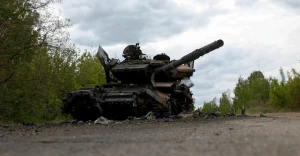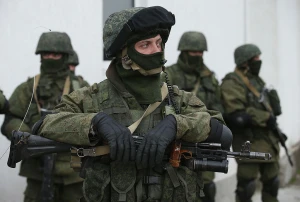
Events in Israel may change Middle East and influence war Russia expects to wage on Ukrainian soil. Column by Vitaliy Portnikov
There is a real war in the Middle East. Militants from the Gaza Strip have broken through into Israel. In many places on the border between Israel and the Gaza Strip, there are clashes, and many civilians are being held hostage by the attackers
Israel is also currently under massive rocket attack from the Gaza Strip. Rockets are even reaching Jerusalem, where they have already hit the hills on the outskirts of the city. Other Israeli cities are also under attack.
Obviously, the outbreak of the war, which coincided with the last day of the Jewish holidays, came as a surprise to both the Israeli Defence Forces and the country's intelligence services. Until recently, it was believed that Hamas, which controls the Gaza Strip, was not interested in active hostilities and that it was possible to reach an agreement with it to reduce escalation. Such an agreement, by the way, was reached just a few hours before the attack with the mediation of Arab countries. And it was believed that in the near future Israel would not be threatened by the Gaza Strip.
However, now, for the first time in 50 years after the Yom Kippur War, the Israeli Defence Forces have declared a state of war, which is unprecedented news for the entire region. Of course, Israel is now preparing for a harsh response to the militants on its territory, threats to civilians and rocket attacks. It is quite obvious that the question of the country's readiness for such hostilities will arise. After all, it is now clear that the relevant services did not prepare for the attack, that there may not be enough bomb shelters and appropriate actions by the special services for an attack of this intensity, that the government underestimated the danger that Israel faced directly from Hamas and other Palestinian terrorist organisations that are now joining the attack.
A Hamas attack on Israel could have serious consequences for the international situation. The history of recent decades shows that a war in the Middle East always becomes a central moment of destabilisation for relations between the West and the Arab world, changes the configuration of relations, and can undermine existing agreements. And, of course, such a war shifts the focus of attention away from all the events that took place in the world before the crisis in the Middle East. Especially if we witness a new major confrontation.
Therefore, one of the main beneficiaries of this war may be Russian leader Putin, whose government has long maintained close contacts with Hamas and was in fact the first government to be ready for a dialogue with the leadership of this terrorist organisation after Hamas won the parliamentary elections in the Palestinian Authority and established its control over the Gaza Strip. For Russia, it is quite important that wars are now breaking out in different regions of the world so that the West cannot focus on helping Ukraine and Moscow has its hands free to continue the war of attrition, which Putin considers to be the real way out of this situation in which he has found himself as a result of the blitzkrieg fiasco on Ukrainian territory.
Of course, it is worth remembering that among those who will support Hamas in its confrontation with Israel and its readiness to continue fighting are Russia's allies, first of all the Islamic Republic of Iran, which helps Hamas with weapons and economic survival after the terrorist organisation lost support in the Arab world and cannot hope for significant assistance unless it refuses to escalate. We are witnessing coalitions being reformatted and intentions changing, as Hamas attacked Israel just before the country's possible normalisation of relations with Saudi Arabia.
Thus, a crisis could arise not only as a result of this Hamas attack, but also if Israel confronts Arab countries. And this could happen if the Israeli army launches a response operation against Hamas militants in the Gaza Strip itself. Here, Arab governments will react quite seriously to what will happen during this retaliatory action to the civilian population of the Gaza Strip, which is now welcoming terrorists returning from Israeli territory.
So, we are now on the eve of stunning tragic events that may have an impact on the entire international situation, not only in the next day, not only in the next few days, but perhaps in the coming months and even years. If we recall how the Yom Kippur War changed the international situation, after which oil prices were never the same as before the Arab attack on the state of Israel, which changed international alliances and configurations that have never returned to their previous state, we can imagine how a new war, unless it ends in a matter of hours, could change the face of the Middle East and the world, and thus influence the war that Russia expects to wage on Ukrainian soil in the months and years ahead.
All calculations amid the crisis in the Middle East, as the history of mankind shows, may prove to be in vain and shift in a completely different, not yet foreseen direction. So we can only hope that a new war in the Middle East will not escalate into a global crisis, which is not yet clearly and concretely predictable.
About the author. Vitaliy Portnikov, journalist, Shevchenko Prize winner
The editors do not always share the opinions expressed by the authors of the blogs.
- News














































